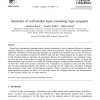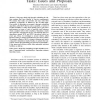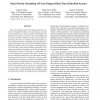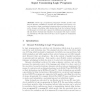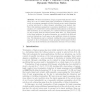118
click to vote
CL
2000
Springer
15 years 1 months ago
2000
Springer
Recent logic programming languages employ dynamic scheduling of calls to improve e ciency of programs. Dynamic scheduling is realized by allowing some calls to be dynamically &quo...
JSW
2007
15 years 1 months ago
2007
Abstract— This paper deals with dynamic scheduling in realtime systems that have Quality of Service requirements. We assume that tasks are periodic and may miss their deadlines, ...
104
click to vote
FMSD
2007
15 years 2 months ago
2007
Real-time embedded systems are often specified as a collection of independent tasks, each generating a sequence of event-triggered code blocks, and the scheduling in this domain ...
162
click to vote
ICDCS
1996
IEEE
15 years 6 months ago
1996
IEEE
Efficiently scheduling parallel tasks on to the processors of a shared-memory multiprocessor is critical to achieving high performance. Given perfect information at compile-time, ...
121
click to vote
ICCAD
2000
IEEE
15 years 6 months ago
2000
IEEE
Synchronous Data Flow (SDF) is a well-known model of computation that is widely used in the control engineering and digital signal processing domains. Existing scheduling methods ...
113
Voted
ESOP
2001
Springer
15 years 6 months ago
2001
Springer
Abstract. In logic programming, dynamic scheduling refers to a situation where the selection of the atom in each resolution (computation) step is determined at runtime, as opposed ...
116
Voted
ISLPED
2003
ACM
15 years 7 months ago
2003
ACM
This paper develops a technique that uniquely combines the advantages of static scheduling and dynamic scheduling to reduce the energy consumed in modern superscalar processors wi...
109
click to vote
LOPSTR
2004
Springer
15 years 7 months ago
2004
Springer
Most logic programming languages actually provide some kind of dynamic scheduling to increase the expressive power and to control execution. Input consuming derivations have been i...
116
click to vote
ICLP
2004
Springer
15 years 7 months ago
2004
Springer
Abstract. We study termination of logic programs with dynamic scheduling, as it can be realised using delay declarations. Following previous work, our minimum assumption is that de...
